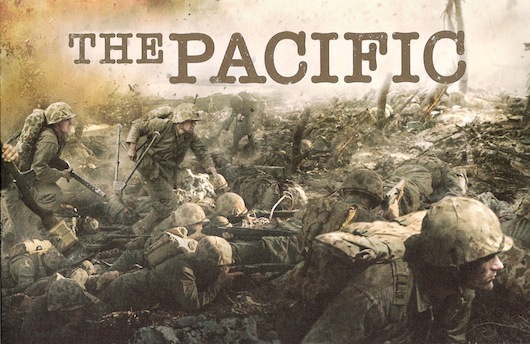
Pam and I just finished watching “The Pacific,” the 2010 HBO mini-series produced by Tom Hanks and Steven Spielberg. This 10-part series follows the stories of three real-life Marines who fought in the Pacific war against the Japanese. Robert Leckie and Eugene Sledge both wrote books about their experiences: “Helmet for My Pillow” and “With the Old Breed” respectively. They both died in 2001. The other person was John Basilone, a Medal of Honor winner who was killed on Iowa Jima.
Basilone had been in the military since around 1937. Leckie enlisted in the Marines after Pearl Harbor. They both fought on Guadalcanal. Sledge enlisted in the Marines in December 1942. Both he and Leckie faught on Peleliu. Leckie’s combat service ended there. There is a brief sequence showing Basilone’s heroic actions on Iowa Jima, and then the 9th episode is entirely about Sledge on Okinawa.
The three stories are intertwined nicely. I’ve read Leckie’s book, but not Sledge’s or any of the books about Basilone. I imagine the directors took some liberty with the stories–and I’ve heard that they did–but I suspect it was minor. They could have had Leckie and Basilone meet in some way on Guadalcanal, or Leckie and Sledge cross paths on Peleliu, and it would certainly have been interesting. But they didn’t do that.
“The Pacific” is a companion to the 2001 series “Band of Brothers,” which followed an Army company through the European theater fighting the Germans. Obviously, people will draw comparisons. Overall, I would say I enjoyed “Band of Brothers” more, and felt it was better in a lot of ways. But it was a different war–cleaner, more “civilized,” if you can use that term with war. The war against the Japanese was much more brutal, dirty, ambiguous. More like Vietnam.
I found it more difficult keeping track of the action in “The Pacific.” It didn’t help that so many of the actors looked alike. In that respect, I would say the casting was terrible. I had a tough time keeping characters straight. Someone would be killed and I would think it was somebody else. Very confusing. Fortunately, the three main characters–Leckie, Sledge, and to a lesser extent Basilone–were pretty distinct. But I gave up trying to keep some of the other soldiers straight, and that hurt my experience as a viewer.
Another complaint I have is their depiction of the battle for which Basilone won the Medal of Honor on Guadalcanal. They seriously underplayed it. Seriously. They showed a battle sequence that lasted maybe 5 minutes, and sure, Basilone was heroic. But the real story: Basilone’s regiment came under attack by 3000 Japanese soldiers in a battle that lasted 3 days, and ended with only Basilone and 2 other Marines still fighting. “The Pacific” gives us no sense of what actually transpired. There is a scene, after Basilone returns to the States, where someone reads aloud, in Basilone’s presence, a newspaper account of what happened. But I got the impression, from the context and from Basilone’s demeanor, that it was an exaggerated news account in a country wanting a hero. I didn’t realize the full extent of Basilone’s heroics until I read about him on Wikipedia.
The most interesting character was nicknamed Snafu, and played by an actor named Rami Malek. He went through the war with Sledge, and pretty much stole every scene he was in, I thought. I figured he was a character just made up for dramatic effect. But at the end, we find out he was a real guy. I’m wondering how he was actually portrayed in “With the Old Breed.”
I think the idea of following three Marines with great true stories was a good idea. It was also good to focus entirely on grunt footsoldiers, as “Band of Brothers” did. In following three Marines, they left out representing the crucial sea and air war in the Pacific. But through those three Marines, they covered well the life of Marines in the Pacific theater, from Guadalcanal to Okinawa. Neither series tried to be representative of the entire war, and that was wise. In both theaters, the really crucial element was the common footsoldier, and that’s where they focused.
Both series are fairly graphic, but it seems to me that “The Pacific” goes further than “Band of Brothers” in that area. “The Pacific” more effectively shows the horrors of war, probably because what Marines experienced in the Pacific was so terribly horrific.
I highly recommend both series. I think “Band of Brothers” is more interesting and better done, but you really need to watch both series.





